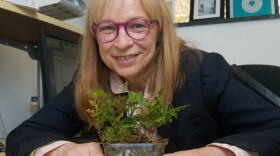
Joe Palca
Joe Palca is a science correspondent for NPR. Since joining NPR in 1992, Palca has covered a range of science topics — everything from biomedical research to astronomy. He is currently focused on the eponymous series, "Joe's Big Idea." Stories in the series explore the minds and motivations of scientists and inventors. Palca is also the founder of NPR Scicommers – A science communication collective.
Palca began his journalism career in television in 1982, working as a health producer for the CBS affiliate in Washington, DC. In 1986, he left television for a seven-year stint as a print journalist, first as the Washington news editor for Nature, and then as a senior correspondent for Science Magazine.
In October 2009, Palca took a six-month leave from NPR to become science writer in residence at The Huntington Library, Art Collections, and Botanical Gardens.
Palca has won numerous awards, including the National Academies Communications Award, the Science-in-Society Award of the National Association of Science Writers, the American Chemical Society's James T. Grady-James H. Stack Award for Interpreting Chemistry for the Public, the American Association for the Advancement of Science Journalism Prize, and the Victor Cohn Prize for Excellence in Medical Writing. In 2019, Palca was elected to the American Academy of Arts and Sciences for outstanding achievement in journalism.
With Flora Lichtman, Palca is the co-author of Annoying: The Science of What Bugs Us (Wiley, 2011).
He comes to journalism from a science background, having received a Ph.D. in psychology from the University of California at Santa Cruz, where he worked on human sleep physiology.
-
After 10 weeks, hypertensive rats fed a diet consisting of 5 percent asparagus had lower blood pressure than their counterparts fed a standard rat diet.
-
Underneath a receding glacier in the Canadian Arctic, researchers found something surprising: a kind of plant related to moss that was not only still green, but also growing.
-
This enterprising technologist is designing for a future where computers are intuitive and anticipate our every need. We're not there yet, but she has started a company that aims to imagine, build and test tomorrow's gadgets today.
-
Doctors treating Secretary of State Hillary Clinton have provided more details about her condition. Clinton was admitted to New York Presbyterian Hospital on Sunday. The doctors say a brain scan revealed a blood clot that was situated in the space between the brain and skull behind her right ear. According to her doctors, the condition is not life threatening.
-
Experts are taking a close look at the country's levees after the failure of one caused massive flooding in New Jersey during Superstorm Sandy. Some argue that rebuilding levees may only set the stage for the next flooding disaster.
-
What causes the bright streaks in the night sky when we see shooting stars? Science correspondent Joe Palca ventured down to Venice Beach to demonstrate how meteor showers work.
-
Summer living is supposed to be easy — school is out, the days are long, the traffic eases. But it's not all diving boards and lemonade: Summer can throw us some curveballs, too. NPR kicks off its Summer Science series with tips from a fire scientist on how to build the perfect campfire.
-
Summer living is supposed to be easy — school is out, the days are long, the traffic eases. But it's not all diving boards and lemonade: Summer can throw us some curveballs, too. NPR kicks off its Summer Science series with tips from a fire scientist on how to build the perfect campfire.
-
In 1543, when Nicolaus Copernicus made the astounding claim that Earth revolves around the sun, not the other way around, his ideas were met with scorn. "It went against everything that your senses tell you. It went against common sense," says author Dava Sobel, who wrote a new book about the astronomer.
-
Amborella is the first known flowering plant and, like the platypus, a genetic dead end. Selaginella's relatives are the fossils in fossil fuel. Now, scientists are studying the genes of these plants, looking for clues about evolution and compounds that might be applied to medicine or agriculture.









